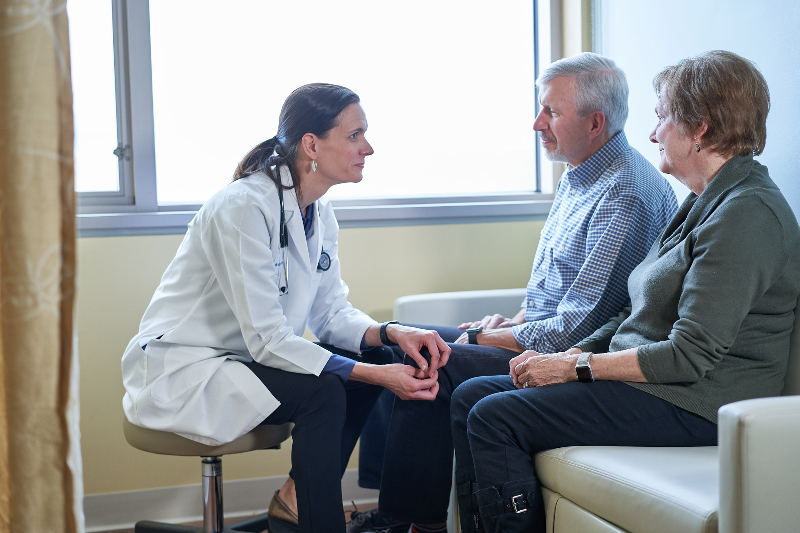When patients are dealing with a potential genetic diagnosis for serious conditions such as breast…

4 ways genetic counseling helps physicians, patients evaluate health risks
Kaiser Permanente’s genetic counselors work with patients and members to evaluate health risks related to family genetics and answer increasingly complicated questions so that individuals can make more informed health decisions and actions in partnership with their physicians.
“Genetic counselors constantly innovate care delivery for the benefit of Kaiser Permanente members, patients, and the Permanente Medical Groups,” says Nancy Gin, MD, executive vice president and chief quality officer for The Permanente Federation.
Learn about 4 ways that genetic counseling can support shared decision-making at the Permanente Medical Groups.
1. Genetic counselors provide specialized guidance on inherited conditions
“Genetic counselors are health care professionals with advanced training in all areas of clinical genetics and psychosocial counseling who offer specialized care to patients seeking information and guidance about inherited conditions affecting them or their families,” says Pim Suwannarat, MD, regional chief and genetics chair for the Mid-Atlantic Permanente Medical Group.
At Kaiser Permanente, genetic counselors work with physicians and patients to:
- Collect and interpret patients’ personal and family medical histories.
- Discuss the risks, benefits, and limitations of genetic testing.
- Order and interpret the results and implications of genetic testing for patients and their families.
- Provide emotional support to help patients deal with the effects of genetic risk or identified health condition on their lives.
- Refer patients to appropriate specialists to manage their conditions and help communicate this information to family members who might also be at risk.
Related article: Pim Suwannarat, MD, sheds light on epigenetics
2. Kaiser Permanente provides evidence-based, patient-centered genetic counseling
The genetic counselors at Kaiser Permanente provide patient-centered, culturally appropriate, evidence-based clinical genetics services to members on an as-needed basis. Depending on the region, these services may include preconception, prenatal, pediatric, and adult cancer and noncancer genetics, as well as cardiac, metabolic, neurological, and renal genetics specialty services and laboratory consultations, among others.
“Over 5,000 certified genetic counselors practice in a variety of health care settings across the United States, and Kaiser Permanente employs about 150 of them,” says Monica Alvarado, MS, licensed certified genetic counselor and regional genetic services administrator for the Southern California Permanente Medical Group. “That’s about 3% of all genetic counselors in the United States.”
Related article: Research to focus on family risk of cancer
3. Genetic counseling can help guide physicians and patients with shared decision-making
The American College of Medical Genetics and Genomics maintains a list of 73 genes and conditions for which abnormal variants can lead to severe outcomes that are “medically actionable,” meaning there is the possibility of early, pre-symptomatic diagnosis and effective interventions or treatment to prevent or diminish the health impacts of the condition. The list includes other forms of inherited cancer predisposition, cardiomyopathies, and neuromuscular and metabolic conditions, with more being added every year.
As genetic tests become more accessible and their results more complex, genetic counselors play a key role in helping physicians and patients understand how the combination of test results, personal medical history, and family history impact health, and they can help guide shared decision-making.
Related article: Courageously facing a family history of breast cancer
4. Understanding genetic risks is a key component of precision medicine
The future of health care is in precision medicine, an emerging approach for disease treatment and prevention that considers individual variability in genes, environment, and lifestyle. Genetic counseling is at the forefront of this evolution.
At Kaiser Permanente in Hawaii, for example, genetic counselors partner with a multidisciplinary team to implement universal screening in colorectal and endometrial cancer using germline testing, which identifies more patients with Lynch syndrome than traditional tumor testing. Patients with Lynch syndrome have an increased risk for cancer and may benefit from targeted cancer treatment.
“In addition to identifying and treating these conditions after symptoms appear, genetic counselors can also educate about risk, support healthy life choices, and help facilitate screening for disease long before symptoms even occur,” Dr. Suwannarat says.
Related article: Michael Kanter, MD, and Patrick Courneya, MD, examine the promise, challenges of precision medicine
Note: For more information, visit Kaiser Permanente’s Genetics page.

